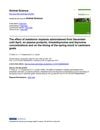 10 citations,
June 2005 in “Small ruminant research”
10 citations,
June 2005 in “Small ruminant research” Melatonin treatment may increase cashmere production in Spanish goats.
 10 citations,
April 1995 in “Animal Science/Animal science”
10 citations,
April 1995 in “Animal Science/Animal science” Melatonin implants can change the seasonal prolactin levels and hair growth in adult cashmere goats but not in juveniles, and don't delay spring moult for better fiber harvesting.
 9 citations,
January 2017 in “Annals of Dermatology”
9 citations,
January 2017 in “Annals of Dermatology” The study found genetic differences related to hair development that may explain hair loss in a patient with Trichorhinophalangeal syndrome type I.
 9 citations,
January 2014 in “DARU Journal of Pharmaceutical Sciences”
9 citations,
January 2014 in “DARU Journal of Pharmaceutical Sciences” Cuscuta reflexa extracts helped regrow hair in rats with drug-induced hair loss.
 8 citations,
November 2022 in “International Journal of Cosmetic Science”
8 citations,
November 2022 in “International Journal of Cosmetic Science” Human hair varies widely and should be classified by curl type rather than race.
 8 citations,
August 2020 in “Clinical and Experimental Dermatology”
8 citations,
August 2020 in “Clinical and Experimental Dermatology” Spironolactone is a low-cost, effective, and generally safe treatment for various skin conditions related to hormones.
 8 citations,
January 2020 in “Plastic and Aesthetic Nursing”
8 citations,
January 2020 in “Plastic and Aesthetic Nursing” The article concludes that different types of hair loss require specific treatments and psychological support is important.
 8 citations,
October 2019 in “Immunological investigations”
8 citations,
October 2019 in “Immunological investigations” The AIRE gene variant rs2075876 is linked to a higher risk of alopecia areata in males.
 8 citations,
July 2012 in “Cambridge University Press eBooks”
8 citations,
July 2012 in “Cambridge University Press eBooks” Androgens can both increase body hair and cause scalp hair loss.
 7 citations,
August 2022 in “Nature communications”
7 citations,
August 2022 in “Nature communications” A specific group of slow-growing stem cells marked by Thy1 is crucial for skin maintenance and healing in mice.
 7 citations,
March 2022 in “Scientific reports”
7 citations,
March 2022 in “Scientific reports” Removing anthrax toxin receptor 1 in pigs prevents Senecavirus A infection and causes a rare disease similar to GAPO syndrome.
 7 citations,
March 2021 in “Journal of animal science/Journal of animal science ... and ASAS reference compendium”
7 citations,
March 2021 in “Journal of animal science/Journal of animal science ... and ASAS reference compendium” Blocking prolactin increases the activity of secondary hair follicles in cashmere goats.
 7 citations,
July 2020 in “Pigment cell & melanoma research”
7 citations,
July 2020 in “Pigment cell & melanoma research” RT1640 treatment reverses gray hair and promotes hair growth in mice.
 7 citations,
December 2017 in “Anais da Academia Brasileira de Ciências”
7 citations,
December 2017 in “Anais da Academia Brasileira de Ciências” 6-Gingerol from ginger may slow down hair growth by affecting certain enzymes and growth factors.
 7 citations,
September 2017 in “Scientific Reports”
7 citations,
September 2017 in “Scientific Reports” Mice with too much sPLA₂-IIA have hair loss and poor wound healing due to abnormal hair growth and stem cell depletion.
 7 citations,
January 2017 in “Journal of cosmetology & trichology”
7 citations,
January 2017 in “Journal of cosmetology & trichology” Good nutrition is crucial for healthy hair and can help with hair loss without medication.
 7 citations,
October 2015 in “American Journal of Primatology”
7 citations,
October 2015 in “American Journal of Primatology” Monkeys with hair loss during pregnancy showed higher stress hormone levels and invested differently in their offspring.
 7 citations,
January 2015 in “Hair therapy & transplantation”
7 citations,
January 2015 in “Hair therapy & transplantation” Air pollution can cause hair loss, and using antioxidants, special shampoos, and coconut oil can improve scalp health and hair density.
 7 citations,
September 2014 in “European Journal of Dermatology”
7 citations,
September 2014 in “European Journal of Dermatology” Thicker hair grows faster; hair loss patients have slower growth.
 7 citations,
January 2013 in “BioMed research international”
7 citations,
January 2013 in “BioMed research international” Hair follicles and deer antlers regenerate similarly through stem cells and are influenced by hormones and growth factors.
 7 citations,
July 2007 in “Pharmacotherapy: The Journal of Human Pharmacology and Drug Therapy”
7 citations,
July 2007 in “Pharmacotherapy: The Journal of Human Pharmacology and Drug Therapy” The medication lopinavir-ritonavir may cause severe hair loss.
 7 citations,
August 2000 in “Journal of Pediatric and Adolescent Gynecology”
7 citations,
August 2000 in “Journal of Pediatric and Adolescent Gynecology” To improve use of the contraceptive DMPA among adolescents, effectively manage side effects like menstrual changes and weight gain through counseling and guidance.
 6 citations,
September 2022 in “Frontiers in pharmacology”
6 citations,
September 2022 in “Frontiers in pharmacology” Epimedium extract helps increase skin pigmentation and could be a new treatment for conditions with reduced pigmentation.
 6 citations,
April 2019 in “Journal of Cosmetic Dermatology”
6 citations,
April 2019 in “Journal of Cosmetic Dermatology” Hair loss affects women's self-esteem; treatments like minoxidil can help.
 6 citations,
April 2017 in “Journal of Dermatological Science”
6 citations,
April 2017 in “Journal of Dermatological Science” Ovariectomized mice mimic postmenopausal hair loss, and estradiol helps maintain hair density.
 6 citations,
January 2012 in “Journal of Biomedicine and Biotechnology”
6 citations,
January 2012 in “Journal of Biomedicine and Biotechnology” Ustekinumab might work for severe psoriasis, but more research is needed to be sure.
 6 citations,
November 2010 in “Histochemistry and cell biology”
6 citations,
November 2010 in “Histochemistry and cell biology” The proteins transthyretin and megalin are more present in the growth phase of hair, suggesting they might affect hair health and growth.
 6 citations,
August 2007 in “Journal of Surgical Research”
6 citations,
August 2007 in “Journal of Surgical Research” Mice genetically modified to produce more Del1 protein had faster hair regrowth.
 6 citations,
July 2003 in “Journal of Womens Health”
6 citations,
July 2003 in “Journal of Womens Health” Experts say proper treatment and sensitivity are important for women's facial skin issues like acne and unwanted hair.
 5 citations,
September 2020 in “Molecules”
5 citations,
September 2020 in “Molecules” Extracts from three Polynesian plants were found to promote hair growth by affecting cell growth and gene expression related to hair.






























